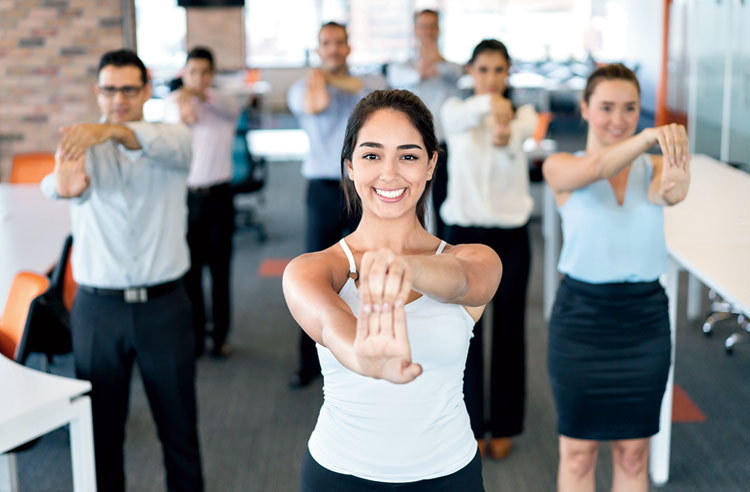The corporate world is moving at a very fast pace across the globe. People are willing to work longer hours, do the extra bit to get ahead in life. There are a lot more opportunities today with new businesses and technologies thriving. Even though these opportunities keep people at the edge of their abilities, it often comes at the cost of not spending quality time with their families, friends and ignoring their health. This is now showing across various aspects of their lives, be it poor relationships within the family or health conditions.
In recent times, a few companies have started to invest in employee’s health and well-being, which is a great start. However, a short-sighted approach has been adopted in most cases, particularly with regards to improving health. For example, most companies tend to provide discounted gym memberships and expect a reduction in absenteeism and sick leaves without investing more time in understanding their employees’ needs and the psychosocial aspects of health. Many companies have not only reported poor physiological conditions, but also the prevalence of mental health issues among employees.
Research has shown over the years that exercise can counter both physiological conditions such as diabetes and cardiovascular disease, as well as psychosocial conditions such as anxiety and depression. However, it is unwise to expect people to start going to gyms to exercise on their own all of a sudden if all they have been doing is sitting 12 hours at their desks for the last five years.
Exercise, or better, ‘movement’, can be helpful, but it cannot be forced on people. Even though our bodies are designed to move rather than hold a position for long hours (except sleeping), motivation and environment play a big role in helping us move.
Therefore, rather than ticking the health boxes by providing discounted gym memberships, proper guidance is crucial. But guidance can only come if companies invest in knowing their employees better, create a more engaging environment, create teamwork through enjoyable yet learning experiences and avoid discrimination based on skin colour, ethnicity and sex (probably the most important today).
Unfortunately, just going to a gym and sitting on an exercise machine with the phones will not help. There are a lot of factors that play a role in motivation and each person is motivated in their own unique ways. Hence, it might be difficult to understand motivation at an individual level. But, creating a better environment can help engage and motivate people particularly when it comes to physical activity and health.
OPTIMISE ENGAGEMENT THROUGH FUN
There are two primary reasons that motivate people to engage in physical activity: enjoyment and perceived competence, that is, people will participate more if they think they are good at it and if it is fun. So creating an environment that encourages these two factors can help more employees engage in physical activities that are long term and, as a result, can help improve fitness. A few strategies are discussed below to optimise engagement through fun and improving physical competence.
1. Increase movement vocabulary (learning to move differently):
Due to the sedentary lifestyle among most corporates, increasing the movement vocabulary is vital. Providing an opportunity to move differently throughout the week can go a long way. For example, instead of repeatedly walking on a treadmill they should be given an opportunity to play a sport of their choice or learn a new dance. Having a broader movement vocabulary complements the brain and the joints.
2. Process driven and task focused:
It is fine to be focused on outcomes but obsessively relying on outcomes for motivation can be problematic. For example, most people tend to give up physical activity easily if all they wanted to do was lose weight fast. Instead, if the focus is on movement skill development, such as learning to do the Surya namaskar (sun salutation) properly without hurting the lower back, then weight loss could be a byproduct and more psychologically rewarding.
3. Do not make it too competitive:
Competition can help people push themselves to do better. However, excessive competition without context can backfire big time. Imagine a sales person of a company who is already exhausted competing with her/his peers at work. The last thing she/he might want is to compete in the golf course too. It is important to know the employees to make better decisions regarding well-being. Sometimes even a simple game of volleying a tennis ball with hands between two people can teach teamwork, power control and creativity without being too competitive (make it difficult for the other person and it will come back to you more difficult).
4. Encouragement and compassion:
These are probably the most overused and underdelivered words today. Encouraging people to move instead of judging them with regards to their weight, ethnicity and sex can take a corporate team a long way. Everyone is dealing with their own challenges and sometimes showing some compassion to the employees can be the biggest investment a company can make.
Kaushik Talukdar is founder and CEO of Athlete Institute (www.athlete.institute) and is the author of Sports Fit — Bridging the gap between research and practice. You can contact him on twitter @Coachkaushik










